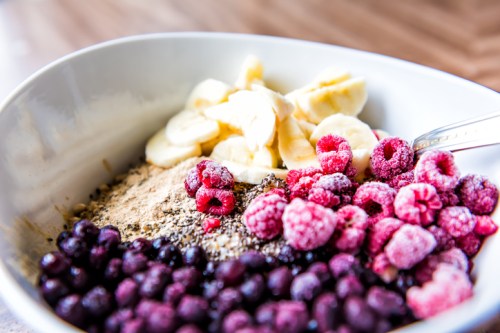What if I told you that there was a food that could help you combat symptoms of stress and depression, boost your energy, and may even give your sex life a glow-up—with almost zero side effects?
Experts in This Article
celebrity nutritionist, healthy cooking expert, and founder of Nutritious Life
These purported health benefits have been used to describe a superfood known as maca, aka a cruciferous vegetable native to the Andes mountains of Peru. While it’s new to many Americans, maca (or Lepidium meyenii) has a long history of culinary and medicinal use by Inca and Peruvian cultures—think more than 1,500 years.
The main edible part of the maca plant, the root, grows underground. It exists in several colors, ranging from white to black, but you’ll generally find maca root dried and in powder form (though it’s also available in capsules and as an extract).
For the indigenous peoples of the Andes, maca root has been a valuable commodity and dietary staple for centuries thanks to its high nutritional value. For one, maca is a rich source of several necessary vitamins and minerals, including vitamin C, iron, potassium, and vitamin B6. Maca root is also classified as an adaptogen, or an herb that is said to help your body fight stress and achieve homeostasis.
“It’s incredibly nutrient-dense,” Keri Glassman, MS, RD, CDN, founder of Nutritious Life previously told Well+Good. Maca is also a solid source of protein—key for getting shiny hair and strong nails. “Maca has a lot of vitamin C, and that increases your collagen and fights free radicals that can cause everything from skin damage to inflammation,” she adds. “It’s also got vitamins D and E, which regulate collagen production as well.”
In terms of flavor, maca root powder has a nutty, earthy taste that tastes delicious when stirred into a bowl of oatmeal, added to smoothies, or made it into a fermented beverage called maca chicha. But there’s one catch: There hasn’t been much research on maca, period, including its benefits. In fact, a 2014 review of maca benefits found that more clinical study is needed to definitively know and understand the root’s perks. Many of the studies that do exist have been small (as in, only performed on a handful of people) or were only performed on mice or rats (meaning the results can’t necessarily directly relate to people, since our bodies are very different). So all of that is to say: While maca has some promising benefits, take all of the below with a grain of salt.
Keeping reading for the purported benefits of maca—and to see how the science stacks up
1. It may boost your libido (and help with fertility)
Much of maca’s reputation involves a lot of promise in the bedroom. Researchers from the psychiatry department at Massachusetts General Hospital, for example, tracked a group of 45 women who experienced sexual dysfunction after starting SSRIs (a common side effect of this type of antidepressant). After 12 weeks, the group of women taking maca as a supplement reported improvements in their levels of desire, with postmenopausal women reporting the most success. This echoed the findings of a very small 2008 pilot study, where people on SSRIs who took three grams of maca a day reported improvement in their libidos. Additional research has shown that maca may improve both sperm mobility and semen quality in men, even if they struggle with infertility.
However, a 2010 review of maca-focused studies also found that there is “limited evidence” that the root can improve sexual function in both men and women. However, the review’s authors also acknowledged that “the total number of trials, the total sample size, and the average methodological quality of the primary studies were too limited to draw firm conclusions.”
2. Maca may increase your stamina during workouts
Good news if you’re looking to make a new PR: In one small study, eight male cyclists completed a 40-kilometer timed trial, were given maca extract over a 14-day period, and then asked to repeat the trial. According to the study’s authors, maca extract supplementation “significantly improved” the participants’ times. (They also reported increased sexual desire.)
Another study published in the journal Pharmaceutical Biology tracked the impact of maca extract on mice during a swim test. The swimming times of the group of mice given the highest dose of maca were “significantly prolonged,” the researchers wrote (basically, they could swim for longer without getting tired), indicating that maca may play a role in combating fatigue during physical activity.
This is a mouse study, so the results aren’t proven to translate directly to humans. But still, it’s pretty exciting stuff, especially if you’re looking for something natural to help you go harder at the gym.
3. It may reduce depression symptoms
A 2015 study conducted by a group of researchers at Victoria University in Australia found that maca consumption decreased levels of depression in study participants (a group of 29 Chinese postmenopausal women). By the end of the study, the women taking maca also showed improved blood pressure compared to the placebo group.
4. It could help with some of the more annoying menopause symptoms
According to a 2017 review of maca-focused clinical trials, the plant shows promise as a remedy for women dealing with hot flashes, night sweats, and other unpleasant symptoms associated with menopause. However, the review’s authors are careful to point out that there “have been very few rigorous trials of maca for menopausal symptoms…the total number of trials, the total sample size, and the average methodological quality of the primary studies were too limited to draw firm conclusions.” So again, more research is needed for a conclusive answer.
5. It may help with your memory and concentration
A handful of studies suggests maca may aid cognitive function—at least in mice. In one study conducted by Peruvian researchers, mice were given a dose of ethanol to get them drunk, then tasked with completing an obstacle course they had already mastered during training sessions. Without maca, the tipsy mice struggled to find their way; but the drunk mice who were given maca extract had no trouble completing the challenge, suggesting, the researchers write, that maca essentially “reversed the effect of EtOH [ethanol].” Translation: The maca appeared to totally counteract some of the memory-impairing side-effects of booze in mice.
Can maca have side effects?
In nearly every maca-focused study, researchers note that the root is usually well-tolerated by subjects (human and mouse alike). This is particularly true when consuming a single serving—studies have shown that a typical three to five gram dose—about a level teaspoon—per day is considered safe for most people, with no apparent side effects.
But again, maca may not be for everybody. As is the case with other supplements, maca isn’t regulated by the FDA, and there’s little information about the safety of long-term maca consumption. You’re probably already on it, but if not: Talk to your doctor if you’re considering taking maca as a supplement, and avoid it altogether if you’re pregnant or breastfeeding. Otherwise, keep an eye on these potential maca side effects:
1. Altered thyroid function
If you have a thyroid condition, don’t take maca until you get the go-ahead from a medical professional. As an adaptogen, maca impacts the endocrine system that rules your body’s hormones. So if you have a thyroid disorder, adding an adaptogen like maca into the mix might not be the best idea without your doctor weighing in.
Plus, some research suggests that eating too many cruciferous vegetables may cause hypothyroidism (a condition where the thyroid gland doesn’t produce enough thyroid hormone) in people who are iodine-deficient. You likely have to be way overdoing it on maca to have this happen—a small study found that people who ate up to five ounces of Brussels sprouts a day didn’t have thyroid issues—but still, something to keep in mind.
2. Hormonal changes
Speaking of hormones, experts caution that maca extract may act like estrogen once it enters the body, and advise people dealing with hormone-sensitive conditions to avoid it entirely. So if you’re being treated for breast cancer, uterine fibroids, endometriosis, or ovarian or uterine cancer, it’s best not to chance it—there are plenty of other superfoods that are totally safe for you to use with the blessing of your doctor.
Originally published on November 12, 2018 with additional reporting by Betty Gold.
Sign Up for Our Daily Newsletter
Get all the latest in wellness, trends, food, fitness, beauty, and more delivered right to your inbox.
Got it, you've been added to our email list.










